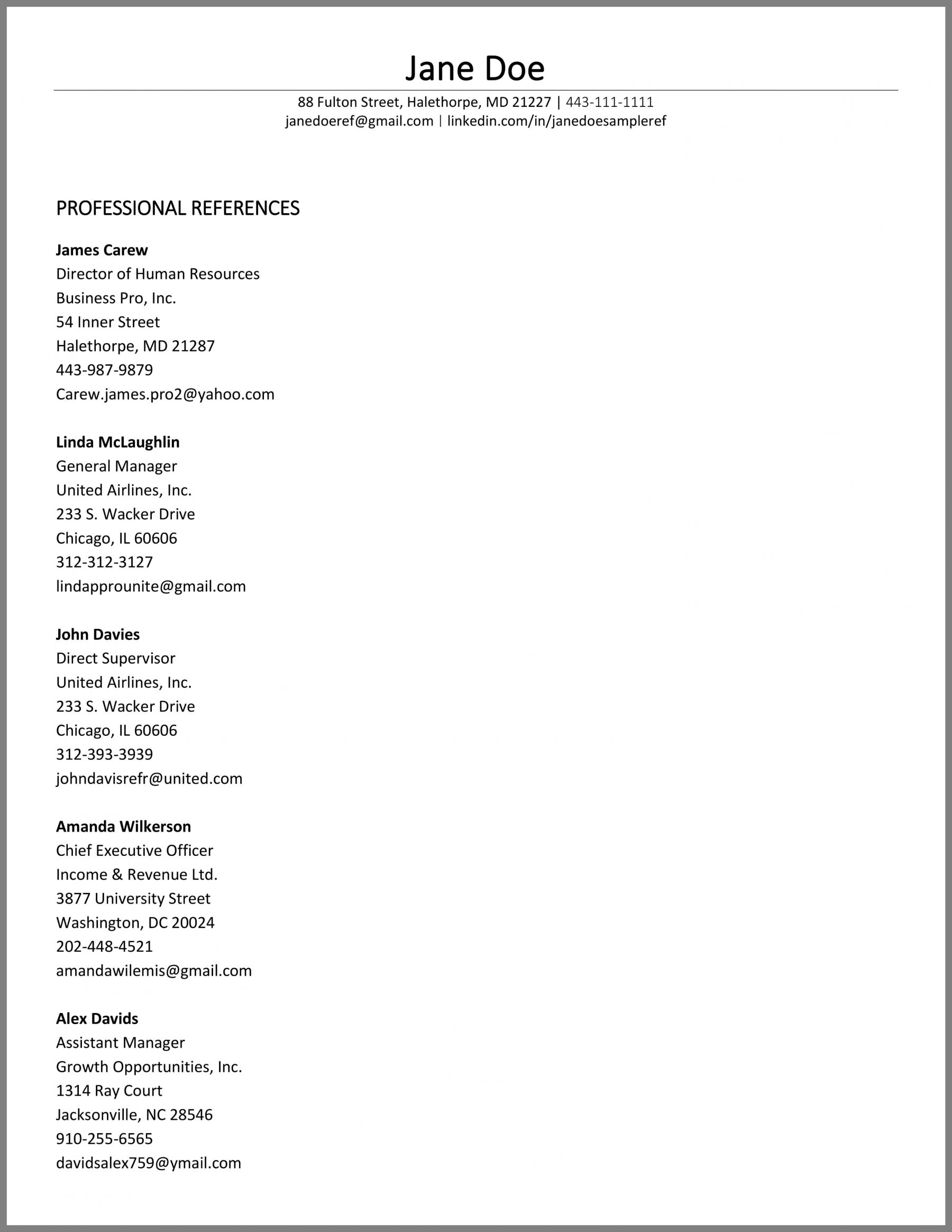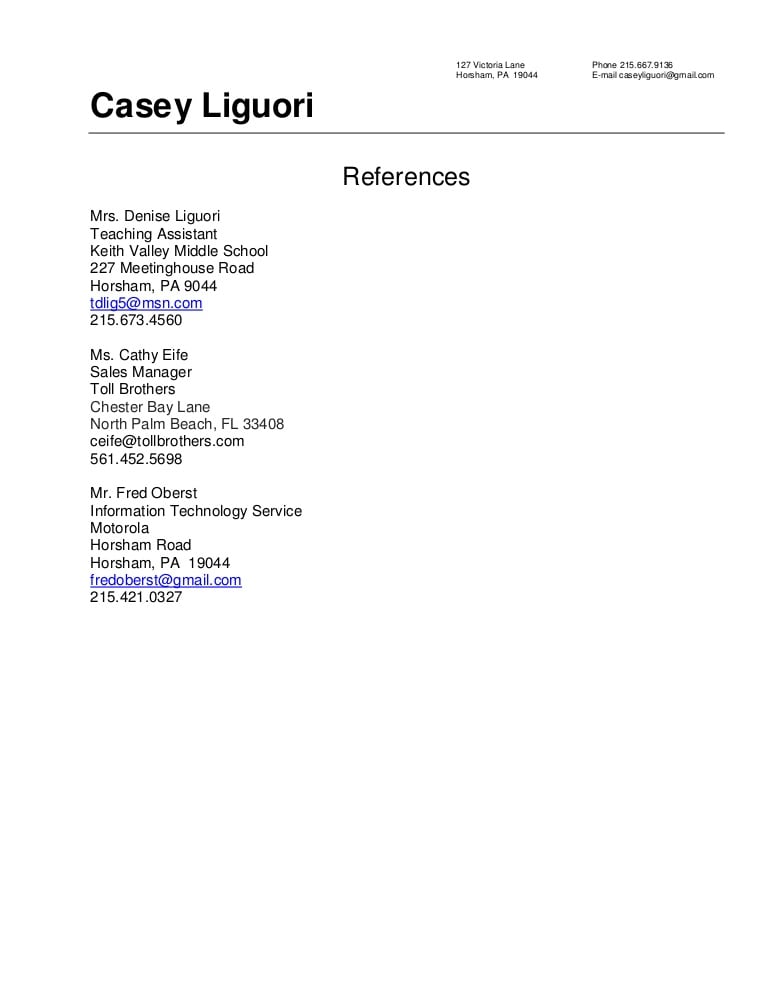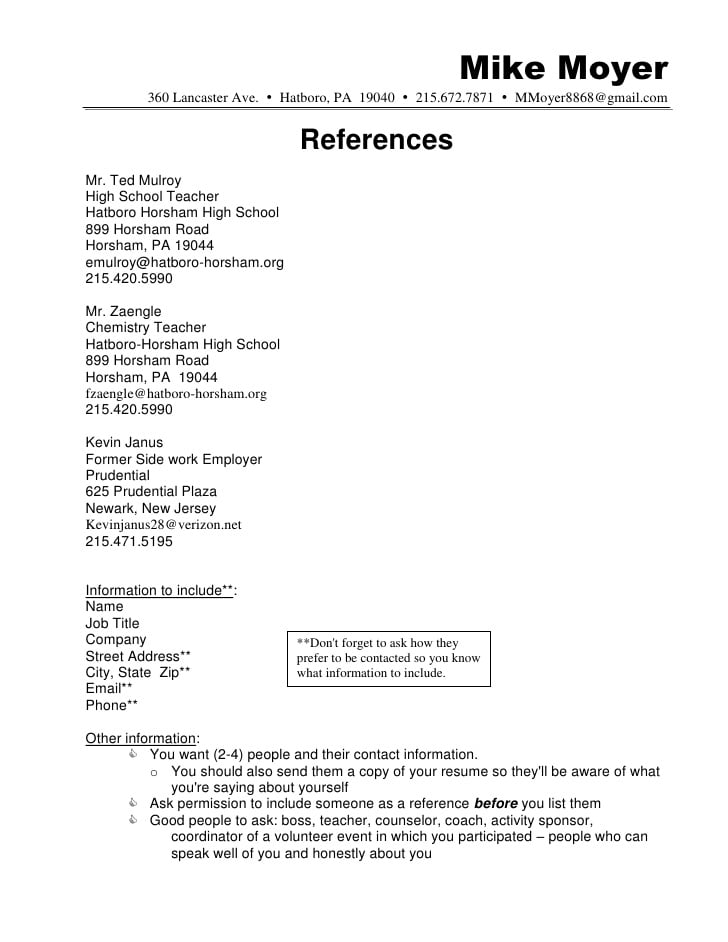How To List References On A Resume
A resume reference list is a document that provides contact and background information on professional references. Recruiters and hiring managers may contact people on your reference list during the hiring process to learn more about your professional history, job performance and other details about the kind of employee you are.
While some employers may ask you to submit resume references as part of the application process, others may ask after a phone screening, face-to-face interview or before the final step in the hiring process. No matter when an employer asks for references, its helpful to prepare a list of several reliable contacts who are able to communicate your best professional attributes.
Image description
Should I Ask Before Listing Someone As A Reference
Yes, since you will be providing their contact information to potential employers, you should always ask permission before listing someone as a reference. This gives them time to prepare what to say and lets them know to expect a call or email. Asking also gives them the chance to say no. This is crucial because you dont want to list someone who is unwilling to provide a favorable review or who feels they have nothing to say.
What Are Cv References
CV references are people whose contact information you give to recruiting professionals so that they can vouch for your character, skills, and work performance.
Recruiters like to use your references to double-check what youve written on your CV, as many candidates actually lie on their applications. In fact, 85% of employers say they have caught applicants lying on their CVs.
If you provide references in your CV, the recruiters will either call or email them and request information about you, such as:
- What is their relationship to you?
- Are you a good employee?
- Why are you no longer working for them?
- What are your defining characteristics such as abilities, work ethics, interpersonal skills, punctuality, etc?
- Will you be a good fit for the job you are applying for?
Don’t Miss: How To Put A Line In Word For Resume
Will They Agree To Be My Reference Or Should I Ask Them First
And humans forget to ask the permission of our references before listing them.
Do not just list down names on your references. It is polite to ask first!
The rule of thumb is to ask permission of the person listed in the references first.
You can send them an email or call them. To do this, you can note this information from their professional LinkedIn ids.
If they grant you the permission, only then you should list them.
Do not worry! They are not cruel at all!
This helps you save your ass in case your employer calls them for verification. Now, they will know before hand.
Also you can make sure their contact information is correct.
When your job profile is closed or you get the job, you can thank them.
Drop in a polite email. If they are a bit close to you, you can also invite them to dinner.
Quick Tip: Provide them with the copy of your resume before hand. This helps them get familiar with your job profile and praise you if needed!
What Should You Do If They Do Not Have Any Past Work Experience

What to do about references if you do not have any prior work experience? Do not worry though, and mention the following sections in place of references:
- A Professional Summary Statement: You can write a short professional summary statement. The summary should be right after your name and contact information.
- Skills Obtained: If you have obtained a range of skills that can be useful in the job applied, you can list those skills. For example, soft skills, time management, word processor, and software development, and others.
- Achievements in School/College: You can mention your achievements in school/college, such as writing in magazines, winning art competitions, expertise in debates, running a book club, or others.
- Certifications: Professional certifications, especially the relevant ones can be useful as reference points, such as any technical certification, specialized writing diploma, CMS tool training, etc.
Read Also: Is It Okay For Resume To Be 2 Pages
How To Write References On A Cv
Important guidelines to follow when writing your CV references:
When To Include References On A Resume
Every word on your resume should be packed with value. Typically, you have one to two pages to explain why youre qualified and well-positioned for the job, and hiring managers only have a short time to read it.
Because references are not always a part of the interview process, you are taking up limited resume space to provide what may end up being irrelevant to employers in this phase. Even including the phrase references upon request on your resume can be unimportant. If their interview process includes references, employers will ask you to provide them.
There are a few rare scenarios in which including references on your resume may be acceptable. If you are in an industry that accepts case studies or testimonials on the resume, it may be appropriate to include the person and contact information for which these apply.
Additionally, it is acceptable to include references if the job description not only requires you to include references but explicitly states that they should be included directly on your resume. If not, you should include your reference list in a separate document.
Related: How to Ask Someone to Be Your Reference: Email Examples
Recommended Reading: How To Put Promotions On A Resume
How Many References Should I Have
Three is the minimum number of references to include on your job application. The employer may be able to form a thorough impression of you as a candidate after listening to diverse perspectives. However, the number of references required may depend on the role and the company. For example, if you’re applying for a senior position for a government agency, the employer may require you to list six or seven references with your application. Contemplate individuals in your professional network who know you well as an employee and list at least three you can contact for your job search.
Related:Types of References and How To Get Them
Ask Your Contacts To Be A Reference
Its important you ask your contacts to be a reference before you provide their names. Not only is this a common courtesy, but it also gives them time to prepare for a phone call or email from the employer. Giving your references plenty of notice also ensures they have time to recall specific examples that highlight why youre the best candidate for the role.
Whether you call, email or ask your prospective reference in person, be sure its something theyre comfortable doing. Your best references will be people who enjoyed working with you and are excited to discuss your talents.
Related: How to Include a Referral in Your Cover Letter
You May Like: How Many References Should You Include
When To Use Character And Personal References
There are many times you might use a character reference , in addition to or as an alternative to an employment reference letter. For example, if you are looking for your first job and have no professional references, a personal reference is a great option. If you are concerned about the reference your employer might give you, you can also add a personal reference to boost your application.
A personal reference is someone who can speak to your character and abilities. This person typically knows you in a more personal capacity. A personal reference can be a neighbor, a volunteer leader, a coach, or even a friend.
Get more information about who to ask for a character reference, and how to write a character reference letter. Here are examples of personal reference letters:
How To List Your References:
A detailed guide to listing references on a resume. Includes helpful tips and examples.
Determine the number of references to include.
The number of references you include in your reference list will depend on your career level. Entry-level positions generally require about three references, while more senior positions may require five to seven references from different times in your professional history.
For the most part, prospective employers will give you guidance on how many references they will want you to include on your reference page.
The best references usually include:
- Current or former managers or supervisors.
- Current or former coworkers.
- Current or former employees or direct reports.
- Academic advisors.
- Professional mentors.
Try to choose only those references that can advocate your qualifications as they relate to the job you are applying for as well as those who you know will give you a positive reference.
Create a separate page for your references.
In general, you should list your references on a separate, dedicated “resume references” page to be added as the very last page of your resume. However, if the job ad does not specifically request references, do not include them in your resume.
Also, do not add the phrase “references available on request.” It wastes valuable space on your resume, and if the recruiter wants references, they will ask for them.
Use the same font as on your resume.
Read Also: Including Linkedin On Resume
Should I Include References On A Resume
In most cases, no. You should not waste space on your resume by including references. The exception is when the job listing specifically asks that you include references on your resume. Typically, job applications have form fields designated for listing references if the employer wants them. Instead of listing references on a resume, use that space for accomplishments, additional skills, or a creative introduction.
Create A Separate Reference Page

More often than not, job applicants who have chosen to include references on their resume will do so on an entirely separate page to be included with the resume.
The second option of listing your references on a separate page is actually the preferred and recommended method.
This is because references are not generally expected to be included on an initial resume and can take up unnecessary space that may be off-putting to hiring managers.
Comparatively, a separate page of references gives the hiring manager the opportunity to look more closely at the information in the resume without becoming visually disoriented by too many sections.
Hint: Not sure how to list other sections of your resume? Check out our Resume Guides to learn more about how to craft each section of your resume.
Also Check: What Awards Can I Put On My Resume
How To Include References In My Cv
If you have decided to include references on your CV after all, heres how you should do it:
The first step to writing CV references is always to ask for permission. It isnt good etiquette to give away someones contact information without first checking if they are ok with it. Besides, you probably wont be getting the best character appraisal if your reference is caught off-guard.
After this, you can get to the formatting.
Here are the steps you should follow to properly format your references:
You can use the following template to help you write your reference list:
Use The Space For Relevant Information
Keep in mind, your resume is a one-page document that gives hiring managers a summary of your relevant experiences, skills and credentials. Rather than taking up an entire line to include this phrase, use it for something that shows you’re a qualified candidate. When deciding what to include on your resume, carefully read through the job description. Try to pull out different phrases and keywords you can incorporate in your resume. By tailoring your resume to the job you want, you can stand out among other candidates.
Related:
You May Like: How To Include Languages In Resume
When To Use Professional References
A professional reference is a reference from a person who can vouch for your suitability for a job. This is the most common kind of reference.
A professional reference should know you in a work-related capacity, such as being a former employer, a colleague, a client, a vendor, a supervisor, or someone else who can recommend you for employment.
If you are a recent college graduate with limited work experience, you might also be able to use a professor or college administrator as a professional reference.
Review information on who makes the best professional reference, how to find out what he or she will say about you, and how to provide references to employers.
How To Ask For References
Youve got your wish list. What to do now?
Of course, sometimes you dont have a choice. If sending your prospective reference an email is the only option, be sure to briefly remind them of who you are. Describe the projects you worked on together and explain where youre heading with your career.
Also, send them a copy of your resume as an attachment. This will help them recall the times when you were working with them and remind them of your achievements and personality.
Give your potential references enough details about the jobs youre applying for. Be specific in what skills and qualities youd like to emphasize. Furthermore, you can even send them the job description. This will help them talk to the employer and endorse your key qualifications.
When it comes to formulating your request, try to be a bit diplomatic. Allow people to refuse gracefully. Here are a few ideas on how to frame your question:
- Would you feel comfortable being my reference in my upcoming job search?
- Would you find some time in the next few weeks to meet and talk about being my reference during my job hunt?
If you get a positive reply, youre almost finished. Take a moment to get your references current titles and contact information right. Also, ask how theyd prefer to be contacted by the recruiter usually either by phone or email.
Heres an example of e-mail request that you can use.
Subject: Larry Brown Reference Request
Dear Mr. Clark,
Best regards,
Read Also: What To Put In Email When Sending Resume
State The Reference’s Full Name And Job Title
On your CV, include the reference’s first and last name. Then, state their formal job title on a separate line beneath their name. If the job title is long, consider using a professional abbreviation for it. For instance, instead of saying, “Vice president of coordinating operations,” you might condense the title to something like, “VP of operations.” Keeping your CV descriptions as brief as possible can help employers scan it more easily.
The Job Description Instructs You To Leave Them Out
If the description for the job you’re applying to says to omit your references, you should leave them out of your CV. There are a variety of reasons employers may choose to explicitly instruct you to leave off your reference list, such as having limited time to review each element of your CV, so it’s important to follow instructions.
Read Also: Microsoft Excel Resume
Q& a: Should You Put References In A Cv
When you apply for jobs, employers may request a CV as a summary of your professional and academic abilities and achievements. One way to provide additional details about yourself to potential employers is by including a list of references in your CV. Employers may use your references to assess whether you are a good fit for the job, so it’s important to decide if including references would benefit you and improve your chances of being hired.
In this article, we discuss when it’s appropriate to include references in a CV and how you should format your reference list.
When Shouldn’t I Include References In A Cv

There are several situations where you should leave a reference list out of your CV, including:
-
The job description instructs you to leave them out
-
You have only one or two appropriate references
-
If they aren’t necessary early in the application process
-
If you have little to no room left on your CV
-
The references aren’t relevant to the job industry
You May Like: Self Employed Business Owner Resume
How Do I List References
You can list your references in a separate document from your resume and cover letter. Start the list with your strongest contact, which may be the professional who has the greatest knowledge of who you are as an employee. It also may be a contact who has known you for the longest or one with the closest proximity to your industry contributions. For example, if you’re applying for an entry-level marketing position, then your strongest reference may be your direct supervisor when you were a marketing intern.
Here are the details about your reference to include on your list:
Related:
When Do I Need Recommendation Letters
Generally, you only need letters of recommendation if an employer asks for them as part of the application process. In some situations, you can include an unsolicited letter of recommendation to help your application stand out.
A letter of recommendation can be especially helpful if one of your references has connections or influence that might help sway an employer. For instance, if one of your references already works for the company youre applying to, a personal recommendation from them could help. A letter of recommendation may also hold more weight if one of your references has a personal or professional relationship with the person who will make the hiring decision.
Also Check: Sending Resume Via Email Sample